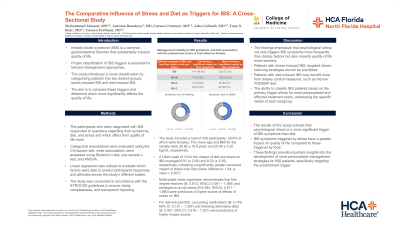Tuesday Poster Session
Category: Functional Bowel Disease
P4051 - The Comparative Influence of Stress and Diet as Triggers for IBS: A Cross-Sectional Study
Tuesday, October 29, 2024
10:30 AM - 4:00 PM ET
Location: Exhibit Hall E

Has Audio

Mohammad AbuAssi, MD
University of Central Florida, HCA Healthcare GME
Gainesville, FL
Presenting Author(s)
Mohammad Abuassi, MD1, Antoine Boustany, MD2, Hamzah A. Qudah, MD3, Carson Creamer, MD4, John Leibach, MD5, Tony S.. Brar, MD4, Yaseen Perbtani, DO4
1University of Central Florida, HCA Healthcare GME, Gainesville, FL; 2Cleveland Clinic Foundation, Cleveland, OH; 3HCA Florida Capital Hospital, Tallahasse, FL; 4University of Central Florida College of Medicine, Gainesville, FL; 5Digestive Disease Associates, Gainesville, FL
Introduction: Irritable bowel syndrome (IBS) is a common gastrointestinal disorder that substantially impacts quality of life. Proper classification of IBS triggers is essential for tailored management approaches. This study introduces a novel classification by categorizing patients into two distinct groups: stress-induced IBS and diet-induced IBS. The aim is to compare these triggers and determine which more significantly affects the quality of life.
Methods: The participants who were diagnosed with IBS responded to questions regarding their symptoms, diet, and stress and which affect their quality of life more. Categorical associations were evaluated using the Chi-square test, while associations were assessed using Student’s t-test, one sample t-test, and ANOVA. Furthermore, linear regression was utilized to evaluate which factors were able to predict participants responses and attitudes across the study’s different scales. The study was conducted in accordance with the STROCSS guidelines to ensure clarity, completeness, and transparent reporting.
Results: The study included a total of 309 participants, 59.9% of which were females. The mean age and BMI for the sample were 28.82 ± 10.8 years and 25.56 ± 5.20 kg/m2, respectively. A Likert scale of 10 for the impact of diet and stress on IBS averaged 6.81 (± 2.69) and 8.23 (± 2.35), respectively, indicating a significantly greater perceived impact of stress over diet (mean difference: 1.44, p-value < 0.001). Multivariate linear regression demonstrates that first degree relatives (B: 0.813, 95%CI: 0.061 – 1.564) and strategies to avoid stress (B:0.284, 95%CI: 0.871 – 1.890) were predictors of higher scores of effects of stress on IBS. For diet-induced IBS, consuming medications (B: 0.749, 95% CI: 0.131 – 1.367) and following alternative diets (B: 0.921, 95% CI: 0.316 – 1.527) were predictors of higher impact scores.
Discussion: The findings emphasize that psychological stress not only triggers IBS symptoms more frequently than dietary factors but also impacts quality of life more severely. Consequently, for patients with stress-induced IBS, targeted stress-reducing strategies should be prioritized. In contrast, patients with diet-induced IBS may benefit more from dietary control measures, such as the low FODMAP diet. The ability to classify IBS patients based on the primary trigger allows for more personalized and effective treatment plans, addressing the specific needs of each subgroup.
Note: The table for this abstract can be viewed in the ePoster Gallery section of the ACG 2024 ePoster Site or in The American Journal of Gastroenterology's abstract supplement issue, both of which will be available starting October 27, 2024.
Disclosures:
Mohammad Abuassi, MD1, Antoine Boustany, MD2, Hamzah A. Qudah, MD3, Carson Creamer, MD4, John Leibach, MD5, Tony S.. Brar, MD4, Yaseen Perbtani, DO4. P4051 - The Comparative Influence of Stress and Diet as Triggers for IBS: A Cross-Sectional Study, ACG 2024 Annual Scientific Meeting Abstracts. Philadelphia, PA: American College of Gastroenterology.
1University of Central Florida, HCA Healthcare GME, Gainesville, FL; 2Cleveland Clinic Foundation, Cleveland, OH; 3HCA Florida Capital Hospital, Tallahasse, FL; 4University of Central Florida College of Medicine, Gainesville, FL; 5Digestive Disease Associates, Gainesville, FL
Introduction: Irritable bowel syndrome (IBS) is a common gastrointestinal disorder that substantially impacts quality of life. Proper classification of IBS triggers is essential for tailored management approaches. This study introduces a novel classification by categorizing patients into two distinct groups: stress-induced IBS and diet-induced IBS. The aim is to compare these triggers and determine which more significantly affects the quality of life.
Methods: The participants who were diagnosed with IBS responded to questions regarding their symptoms, diet, and stress and which affect their quality of life more. Categorical associations were evaluated using the Chi-square test, while associations were assessed using Student’s t-test, one sample t-test, and ANOVA. Furthermore, linear regression was utilized to evaluate which factors were able to predict participants responses and attitudes across the study’s different scales. The study was conducted in accordance with the STROCSS guidelines to ensure clarity, completeness, and transparent reporting.
Results: The study included a total of 309 participants, 59.9% of which were females. The mean age and BMI for the sample were 28.82 ± 10.8 years and 25.56 ± 5.20 kg/m2, respectively. A Likert scale of 10 for the impact of diet and stress on IBS averaged 6.81 (± 2.69) and 8.23 (± 2.35), respectively, indicating a significantly greater perceived impact of stress over diet (mean difference: 1.44, p-value < 0.001). Multivariate linear regression demonstrates that first degree relatives (B: 0.813, 95%CI: 0.061 – 1.564) and strategies to avoid stress (B:0.284, 95%CI: 0.871 – 1.890) were predictors of higher scores of effects of stress on IBS. For diet-induced IBS, consuming medications (B: 0.749, 95% CI: 0.131 – 1.367) and following alternative diets (B: 0.921, 95% CI: 0.316 – 1.527) were predictors of higher impact scores.
Discussion: The findings emphasize that psychological stress not only triggers IBS symptoms more frequently than dietary factors but also impacts quality of life more severely. Consequently, for patients with stress-induced IBS, targeted stress-reducing strategies should be prioritized. In contrast, patients with diet-induced IBS may benefit more from dietary control measures, such as the low FODMAP diet. The ability to classify IBS patients based on the primary trigger allows for more personalized and effective treatment plans, addressing the specific needs of each subgroup.
Note: The table for this abstract can be viewed in the ePoster Gallery section of the ACG 2024 ePoster Site or in The American Journal of Gastroenterology's abstract supplement issue, both of which will be available starting October 27, 2024.
Disclosures:
Mohammad Abuassi indicated no relevant financial relationships.
Antoine Boustany indicated no relevant financial relationships.
Hamzah Qudah indicated no relevant financial relationships.
Carson Creamer indicated no relevant financial relationships.
John Leibach indicated no relevant financial relationships.
Tony Brar indicated no relevant financial relationships.
Yaseen Perbtani indicated no relevant financial relationships.
Mohammad Abuassi, MD1, Antoine Boustany, MD2, Hamzah A. Qudah, MD3, Carson Creamer, MD4, John Leibach, MD5, Tony S.. Brar, MD4, Yaseen Perbtani, DO4. P4051 - The Comparative Influence of Stress and Diet as Triggers for IBS: A Cross-Sectional Study, ACG 2024 Annual Scientific Meeting Abstracts. Philadelphia, PA: American College of Gastroenterology.
